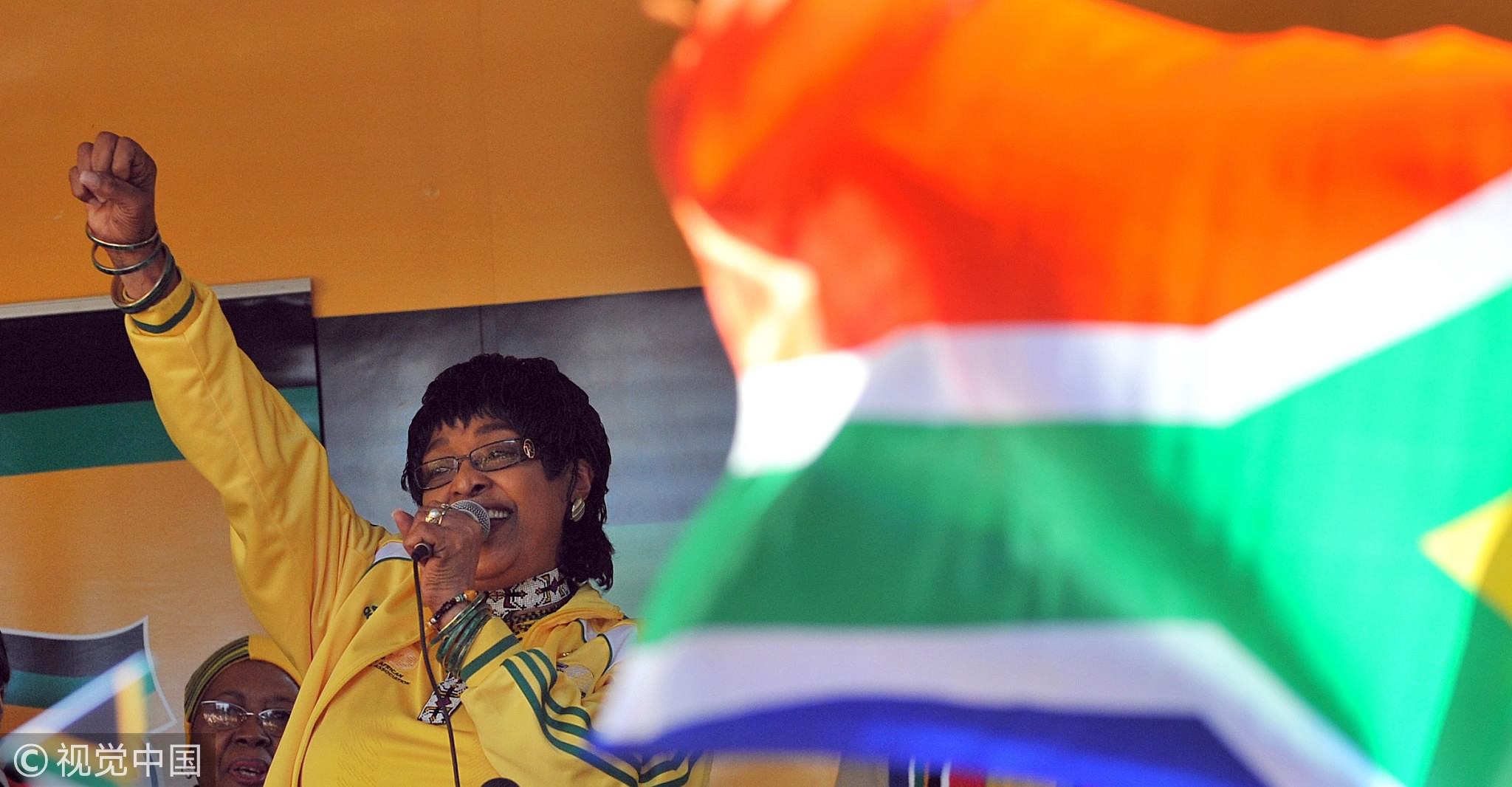
World
22:17, 02-Apr-2018
Winnie Madikizela-Mandela dies at 81
CGTN

Hailed as mother of the "new" South Africa, Winnie Madikizela-Mandela's legacy as an anti-apartheid heroine was undone when she was revealed to be a ruthless ideologue prepared to sacrifice laws and lives in pursuit of revolution and redress.
Her uncompromising methods and refusal to forgive contrasted sharply with the reconciliation espoused by her husband Nelson Mandela as he worked to forge a stable, pluralistic democracy from the racial division and oppression of apartheid.
The contradiction helped kill their marriage and destroyed the esteem in which she was held by many South Africans, although the firebrand activist retained the support of radical black nationalists to the end.
In her twilight years, Madikizela-Mandela, who died on Monday aged 81, had frequent run-ins with authority that further undermined her reputation as a fighter against the white-minority regime that ran Africa's most advanced economy from 1948 to 1994.

Netcare Milpark Hospital in Johannesburg where Winnie Madikizela Mandela, ex-wife of former South African president Nelson Mandela, passed away, April 2, 2018. /VCG Photo
Netcare Milpark Hospital in Johannesburg where Winnie Madikizela Mandela, ex-wife of former South African president Nelson Mandela, passed away, April 2, 2018. /VCG Photo
During her husband's 27-year incarceration, Madikizela-Mandela campaigned tirelessly for his release and for the rights of black South Africans, suffering years of detention, banishment and arrest by the white authorities.
She remained steadfast and unbowed throughout, emerging to punch the air triumphantly in the clenched-fist salute of black power as she walked hand-in-hand with Mandela out of Cape Town's Victor Vester prison on Feb. 11, 1990.
For husband and wife, it was a crowning moment that led four years later to the end of centuries of white domination when Mandela became South Africa's first black president.

'Horribly wrong'
But for Madikizela-Mandela, the end of apartheid marked the start of a string of legal and political troubles that, accompanied by tales of her glamorous living, kept her in the spotlight for all the wrong reasons.
As evidence emerged in the dying years of apartheid of the brutality of her Soweto enforcers, the "Mandela United Football Club" (MUFC), her sobriquet switched from "Mother of the Nation" to "Mugger."

June 4, 2010: South African MP Winnie Madikizela-Mandela addresses members of South Africa's ruling party African National Congress (ANC) during a street party ahead the 2010 FIFA World Cup in Johannesburg. VCG Photo
June 4, 2010: South African MP Winnie Madikizela-Mandela addresses members of South Africa's ruling party African National Congress (ANC) during a street party ahead the 2010 FIFA World Cup in Johannesburg. VCG Photo
Blamed for the killing of activist Stompie Seipei, who was found near her Soweto home with his throat cut, she was convicted in 1991 of kidnapping and assaulting the 14-year-old because he was suspected of being an informer.
Her six-year jail term was reduced on appeal to a fine.
She and Mandela separated in 1992 and her reputation slipped further when he sacked her from his cabinet in 1995 after allegations of corruption. The couple divorced a year later, after which she adopted the surname Madikizela-Mandela.
Appearing at the Truth and Reconciliation Commission (TRC) set up to unearth atrocities committed by both sides in the anti-apartheid struggle, Madikizela-Mandela refused to show remorse for abductions and murders carried out in her name.
Only after pleading from anguished TRC chairman Archbishop Desmond Tutu did she admit grudgingly that "things went horribly wrong."
In its final report, the TRC ruled that Madikizela-Mandela was "politically and morally accountable for the gross violations of human rights committed by the MUFC."
Four years later, she was back in court, facing fraud and theft charges in relation to an elaborate bank loan scheme.
"Somewhere it seems that something went wrong," magistrate Peet Johnson said as he sentenced her to five years in jail, later overturned on appeal. "You should set the example for all of us."
Married to the struggle
Born on Sept. 26, 1936, in Bizana, Eastern Cape Province, Madikizela-Mandela became politicized at an early age in her job as a hospital social worker.
"I started to realize the abject poverty under which most people were forced to live, the appalling conditions created by the inequalities of the system," she once said.

February 11, 1990: President Nelson Mandela is accompanied by his wife Winnie, moments after his release from prison near Paarl, South Africa. /VCG Photo
February 11, 1990: President Nelson Mandela is accompanied by his wife Winnie, moments after his release from prison near Paarl, South Africa. /VCG Photo
Strikingly attractive and with a steely air – her given name, Nomzamo, means "one who strives" – the 22-year-old Winnie caught the eye of Mandela at a Soweto bus-stop in 1957, starting a whirlwind romance that led to their marriage a year later.
But with husband and wife pouring their energies into the fight against apartheid, the relationship struggled before being torn apart after six years when Mandela was arrested and sentenced to life in prison.
Madikizela-Mandela later described her marriage as a sham and the birth of their two daughters, Zindzi and Zenani, as "quite coincidental" to her one true love – the struggle against white rule.
"I was married to the ANC. It was the best marriage I ever had," she often said.
Graca Machel, who stepped into her shoes as South Africa's first lady when she married Mandela in 1998, paid tribute to her predecessor in the years after her union.
"It's unfortunate that in our lives we don't interact very easily, but I want to state very clearly that Winnie is my hero. Winnie is someone I respect highly," Machel once said.
11715km
Source(s): Reuters

SITEMAP
Copyright © 2018 CGTN. Beijing ICP prepared NO.16065310-3
Copyright © 2018 CGTN. Beijing ICP prepared NO.16065310-3